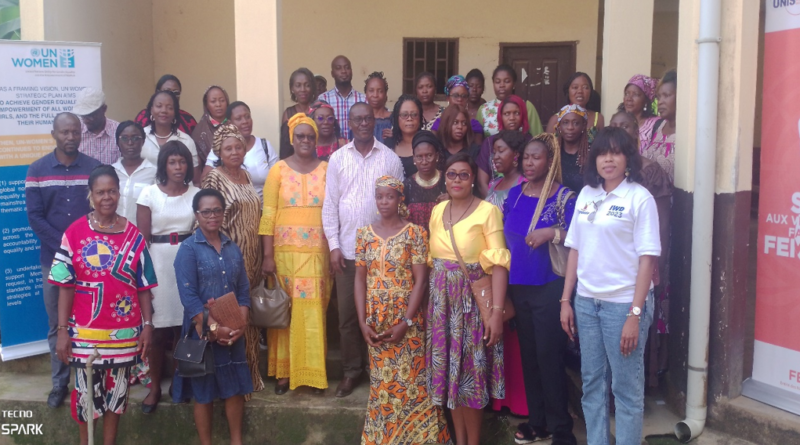Cooperative women from the PROJET DE DÉVELOPPEMENT DES CHAINES DE VALEURS AGRICOLES (PDCVA) receive training in cooperative management and women’s leadership in the towns of Edea, Bafia and Nkongsamba.
As part of the implementation of the Projet de Développement des Chaînes de Valeurs Agricoles (PD_CVA) (Agricultural Value Chain Development Project), 03 training workshops were held for women from cooperatives supervised by the said Project in “Cooperative Management and Women’s Leadership”.
The workshops were held successively in the localities where the basins for the three PD_CVA value chains are located:
- Edéa from July 12 to 14, 2023 at the Hostellerie de la Sanaga for 33 women from oil palm cooperatives;
- Bafia from July 18 to 20 at the Centre de Promotion de la Femme et de la Famille for 32 women from pineapple cooperatives;
- Nkongsamba from August 02 to 04 at MBIFANO Hôtel for 33 women representing cooperatives in three sectors (oil palm, pineapple and plantain).
These 03 workshops followed the one already held in Ebolowa on the same theme in December 2022, for 32 women from cooperatives in the Banana Plantain sector.
The main objective was to train around 250 women in cooperative management and leadership, with a view to equitable access to the advantages and benefits offered by the PDCVA (the various attendance sheets are appended).
All sessions took place under the technical coordination of Ms ABE Solange, Gender Expert at PDCVA, and Mr ATEBA Emmanuel, Program Officer at ONU-Femmes. The workshops were moderated by Madame BANGWENI Hélène Solange, PDCVA focal point at MINPROFF.
The aim of the workshops was to build the capacities of participants identified by the various coordinators in the PDCVA cooperatives, through the development of a range of modules focusing on :
- notions of gender and GBV;
- legal instruments promoting women’s rights;
- notions of leadership and female leadership;
- justifications, assets and obstacles of female leadership;
- the process of setting up a cooperative society;
- management of a cooperative society;
- Financial education (entrepreneurial culture, the importance and stages of drawing up a business plan and financial management).
The working methodology favored participative approaches, with introductory presentations or interactive exchanges enabling participants to answer certain questions of understanding for each module on their own. Group work and case studies, followed by plenary presentations, enabled Leaning by Doing.
The workshops took place over 03 days. The agenda provided for the following
I- THE OPENING CEREMONY
This phase was marked by a word of welcome from Madame BANGWENI Hélène Solange, MINPROFF/PDCVA Focal Point and moderator for the occasion. This was followed by individual presentations by the participants. Mr. ATEBA Emmanuel, Programme Manager at ONU-FEMMES, then gave a brief presentation of the Terms of Reference (ToR) for the activity, highlighting the objectives, expected results and practical details.
The PDCVA was presented by Madame ABE Solange, the project’s gender expert. In her presentation, she explained that the PDCVA is a MINADER project, financed by the African Development Bank (ADB). It receives technical assistance from ONUFEMMES to take gender into account in its various components, notably the production, processing and marketing of banana-plantain, pineapple and oil palm products. In his speech, the EG also announced the creation of three processing plants in Ngwei, Sikoum and Njombé, which should boost oil palm production, for processing into quality palm oil and valuable by-products in Cameroon.
The aim of the workshops was to encourage women to take up positions of responsibility within cooperatives and to become leaders, so that 50% of the cooperatives supported by the PDCVA are run by women.
II- THE WORKSHOPS THEMSELVES
A/-The first few days :
The first few days focused on the presentation of four modules:
II.1- Module 1: Gender and gender-based violence (GBV)
presented by Mr MVOGO MFOMO Jean, Gender Expert at MINPROFF. At the start of his presentation, he defined key terms, including :
- Gender is defined as the socially constructed character of feminine and masculine identities and the social relationships that derive from them. It is intended to highlight disparities, gaps and inequalities between men and women. It is a development priority in which the specific interests of men and women must be safeguarded.
- GBV is defined as violence directed against a person because of his or her sex, with harmful consequences.
To combat economic violence more effectively, we need to know about it and understand it. The speaker addressed the typology of GBV, focusing on economic violence, which makes women more vulnerable. This type of violence is manifested, among other things, by the deprivation of income, work or employment, and unequal pay. The perpetrators are mainly men (spouses, employers, community leaders, parents). The victims are mainly women, wives and young girls. As for the places where this violence is practised, these are more likely to be family, professional, religious, prison and cooperative environments.
The causes of such violence include: level of education, poverty, socio-cultural norms, different perceptions of love and married life, misinformation and ignorance.
The consequences of economic violence are numerous and harmful
1-on the individual (depression, withdrawal, aggressiveness, emotional instability, sleep disorders, suicide attempts);
2-on the family (dysfunction of the family unit, risk of family stigmatization) ;
3-on society (worsening of the phenomenon of street children, prostitution, begging).
Discussions around this module provided an opportunity to talk to participants about methods of reporting and combating GBV.
II.1- Module 2 on exchanges on local prevention mechanisms and the mapping of local GBV management structures was briefly presented by Mr ONDOBO TSALA Yves and Ms ONGONO Natacha from MINPROFF.
Participants learned about (i) ways to prevent GBV through awareness campaigns aimed at men, families, community and religious leaders, (ii) sessions to popularize instruments such as the National Strategy to Fight GBV, (iii) the Widow Support Guide, (iv) the new Penal Code and advocacy with decision-makers.
The mechanisms for managing GBV and the people involved – MINPROFFF’s decentralized services, the security forces (police, gendarmerie), hospitals and the justice system – were also highlighted.

